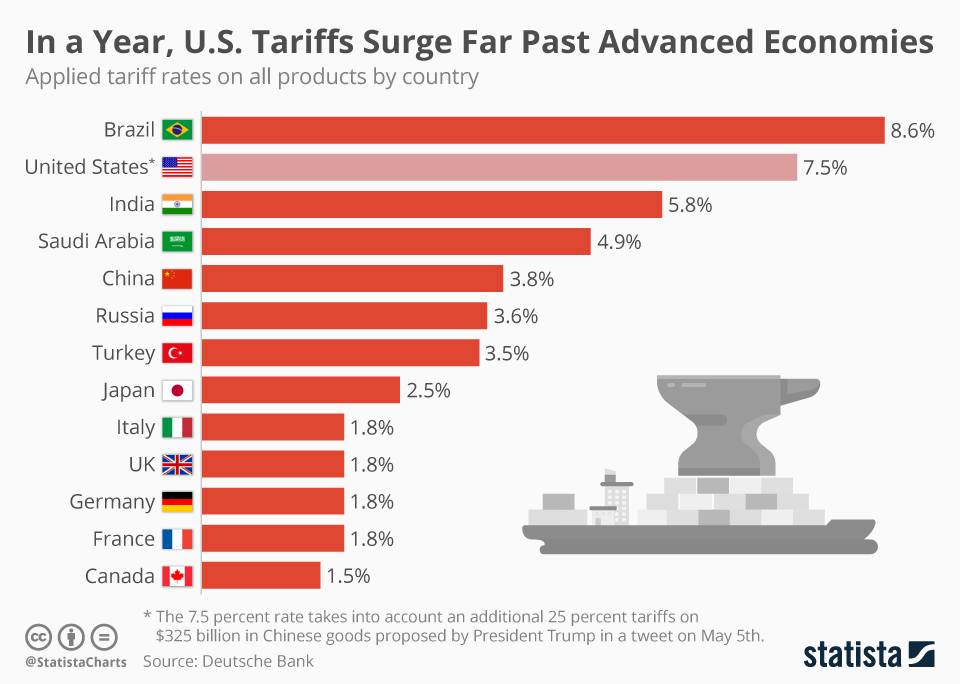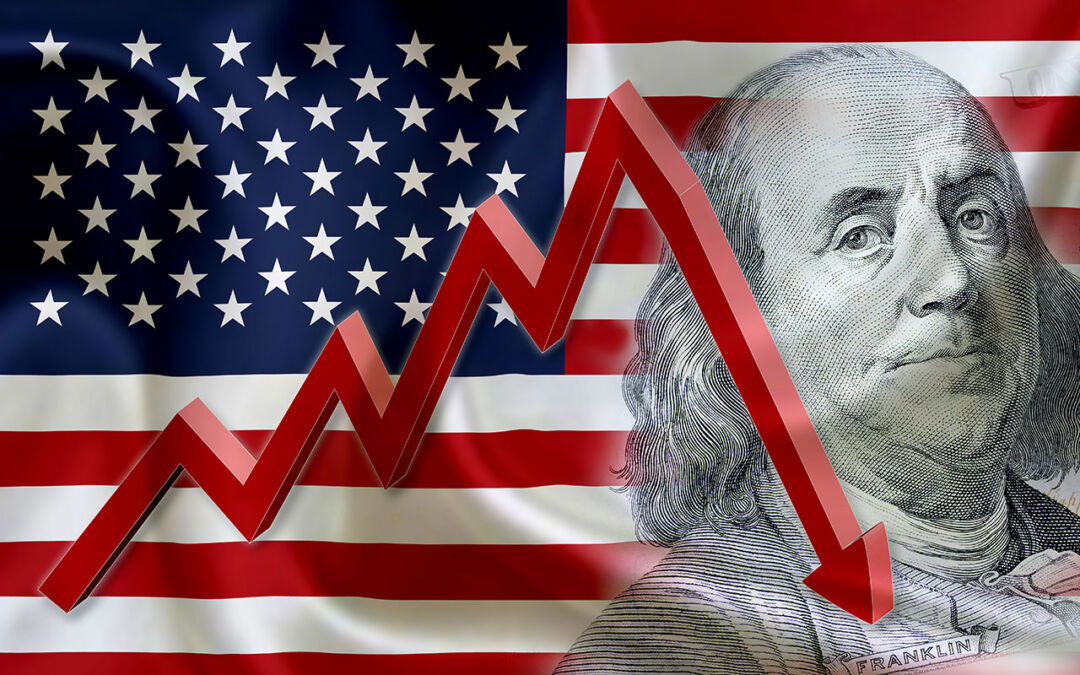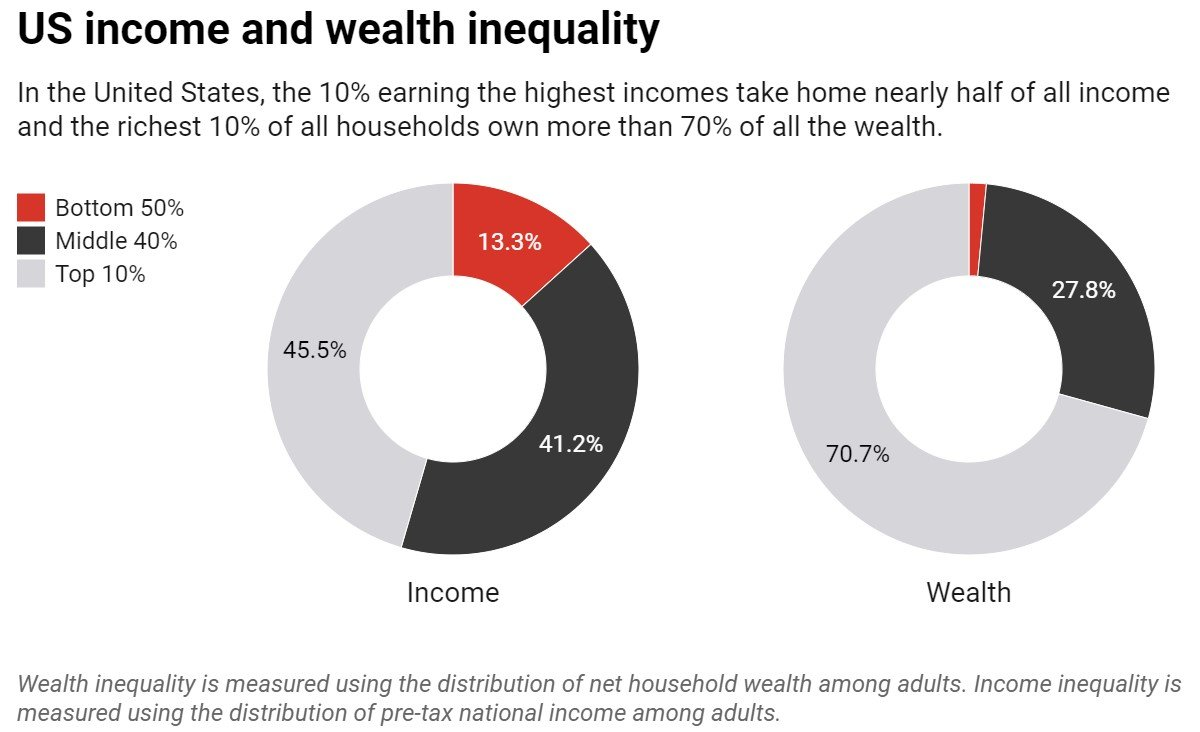The impact of tariffs on American workers is an increasingly hot topic in the realm of U.S. trade policy, particularly with the recent tariffs implemented under the Trump administration. Politicians like Sen. Rick Scott argue that these tariffs will level the playing field for U.S. workers, allowing American industries to flourish by incentivizing domestic production. However, as economists debate the effects of these measures, the potential for an economic downturn due to rising tariffs raises concerns among labor advocates and business owners alike. As trade tensions escalate, particularly in China trade relations, the long-term implications for American employment and wages remain uncertain. Understanding the nuances of how tariffs impact American workers is crucial for navigating the future of trade in a global market.
Exploring the consequences of import duties on U.S. laborers reveals a complex economic landscape marked by heightened discussions around international trade relations. The notion of implementing such tariffs is often framed as a strategy to protect domestic jobs against global competition, especially from nations like China. Advocates like Rick Scott emphasize the necessity of reevaluating trade regulations to favor American manufacturers, while critics warn of potential pitfalls that could lead to job losses and inflation. Navigating through this contentious issue provides insight into the broader implications of tariffs as part of a comprehensive examination of economic policy in America. By addressing these tariffs and their ripple effects, we can better understand how they might reshape the American workforce for years to come.
The Impact of Tariffs on American Workers
Tariffs implemented by the Trump administration have a significant bearing on American workers by attempting to protect domestic industries from foreign competition. Senator Rick Scott argues that these tariffs effectively level the playing field, providing a shield for U.S. manufacturers against lower-priced imports. This protective measure can incentivize American companies to hire more workers, thus enhancing job security. By encouraging local production, tariffs potentially raise the demand for American products, translating into higher wage and employment opportunities for workers across various sectors.
However, the efficacy of tariffs remains widely debated. While some workers might initially benefit, others might face higher prices due to reduced competition. Economists like Jason Furman express concerns that these tariffs can lead to an economic downturn, which, in turn, could negatively affect job growth and stability. As the economy experiences volatility, the long-term consequences for American workers become increasingly uncertain.
Rick Scott’s Defense of Tariffs Under the Trump Administration
Senator Rick Scott has been a staunch defender of tariffs introduced during the Trump administration, viewing them as a necessary strategy to counteract unfair trade practices from countries like China. During discussions about U.S. trade policy, Scott emphasizes that tariffs are a vital tool to persuade other nations to lower their trade barriers, thereby allowing American workers to compete on a more equitable basis. He firmly believes that eliminating excessive tariffs and barriers could bolster the American economy, permitting workers to sell more products domestically and abroad.
Despite criticism from various economic experts, Scott remains optimistic about the potential upsides of these tariff policies. He believes that engaging in negotiations could have been viable, yet he sees unilateral action as a powerful statement against unfair practices. His perspective aligns with the broader Republican viewpoint that prioritizes protecting American jobs against perceived threats from international trade.
Analyzing the Economic Effects of Tariffs on U.S. Trade Policy
The economic implications of tariffs are complex and multifaceted, particularly in the context of U.S. trade policy. Senator Scott’s position suggests that tariffs are designed to protect American interests and reduce trade deficits, particularly with nations like China. He argues that if tariffs push foreign countries to reconsider their trade practices, they can lead to a more favorable trading environment for the U.S.
However, the imposition of tariffs often brings about counterproductive consequences. With significant retaliatory tariffs imposed by China, the intended benefits for American workers are put into question. Tariffs can drive up product prices for consumers and lead to retaliatory actions that can hurt American exporters. As Scott reflects on these economic policies, the skepticism from economists highlights a critical debate about the actual effectiveness of tariffs in fostering long-term economic health.
China Trade Relations and the Tariff Debate
Senator Rick Scott’s views on China shape his approach to tariffs, emphasizing a tough stance against what he perceives as a growing threat to U.S. economic and national security. He asserts that China poses a more significant challenge than Russia, advocating for a complete cessation of trade until fundamental changes occur in their economic policies. For Scott, the methodology involves leveraging tariffs as a bargaining chip to achieve better trade agreements.
This hardline perspective underscores a sentiment among some U.S. officials that tariffs are the only means to level the playing field and protect the interests of American workers. However, the question arises: could such an approach harm trade relations in the long run? As discussions around economic strategy continue, the balance between protecting American jobs and fostering global trade partnerships remains a complex issue.
Assessing the Role of Tariffs in Economic Downturns
The connection between tariffs and economic downturns is a contentious topic, with many arguing that the sudden imposition of tariffs can result in immediate negative repercussions for the economy. The Trump administration’s tariffs have contributed to substantial stock market disruptions and have raised concerns about potential inflationary pressures. As highlighted in discussions among economists, the volatility in markets is often a signal of broader economic uncertainty, which can undermine workers’ confidence and job security.
Senator Scott acknowledges that while he supports tariffs to bolster American workers, he also faces the reality that these measures can carry risks of economic disruption. If miscalibrated, tariffs may inadvertently lead to higher costs for consumers and businesses, perpetuating cycles of inflation that can hurt the very workers they are intended to protect. This highlights the delicate balance policymakers must navigate between pursuing protective measures and maintaining a stable economic environment.
Understanding the Tariff Rate Dynamics
The intricacies of tariff rates shed light on the broader trade narrative, particularly how the U.S. rates compare to those imposed by other nations. For the Trump administration, adjusting tariff rates—such as setting a 10 percent base rate while imposing disproportionately higher tariffs on China—was seen as a necessary tactic to coerce change in trade behavior. Senator Scott supports this strategy, arguing that higher tariffs on nations that engage in unfair practices are essential for protecting U.S. interests.
Nevertheless, the asymmetry in tariff rates can lead to trade friction, with critics arguing that such policies invite retaliation that harms American exporters. The higher tariffs imposed on Chinese products aim to forge a competitive edge for American manufacturers, yet they also risk creating an economic chess match that could have widespread repercussions for global trade dynamics. Understanding these nuanced tariff rate dynamics is vital for comprehending their impact on international relations and economic stability.
Negotiating Trade Agreements vs. Imposing Tariffs
The debate surrounding whether to negotiate trade agreements or impose tariffs remains at the forefront of trade policy discussions. Senator Scott advocates for the latter, perceiving tariffs as a necessary enforcement mechanism against countries that refuse to engage in fair trade practices. He suggests that while negotiations might be a preferable route, a stern approach is warranted when dealing with competitors like China.
Conversely, critics of unilateral tariff actions contend that such measures can alienate potential partners and diminish opportunities for cooperative trade agreements. For U.S. workers, the focus should ideally be on engagement and collaboration to create a more sustainable trading environment, rather than relying solely on punitive measures. This ongoing discourse highlights the challenges of crafting trade policies that effectively protect American jobs while fostering international cooperation.
Future of Tariffs and Their Impact on American Industries
Looking toward the future, the ongoing discourse around tariffs raises questions about their sustainable impact on American industries. The beliefs held by lawmakers like Senator Scott suggest that tariffs could bolster domestic production and safeguard American workers from foreign competition. Yet, as industries adapt to an evolving global market, the effectiveness of tariffs in driving meaningful growth is under scrutiny.
Furthermore, as industries innovate and global market conditions shift, tariffs may need to be reassessed to prevent unintended consequences that adversely affect consumers and businesses. The strategic use of tariffs can be beneficial, yet it requires a careful evaluation of both short-term benefits and long-term consequences for American workers and the economy as a whole.
Balancing National Debt and Trade Policies
The interplay between national debt and trade policies, particularly tariffs, is a critical aspect of effective economic governance. Senator Scott emphasizes the necessity of balancing the budget to improve the nation’s fiscal outlook, an objective that can influence decisions made regarding trade and tariffs. The relationship between trade imbalances and national debt underscores the importance of crafting policies that foster economic growth while managing fiscal responsibilities.
As the U.S. grapples with projected long-term national debt, tariffs serve as one tool among many to potentially stimulate local economies. However, the risk of increasing trade tensions must be weighed against the achievable fiscal benefits. Achieving a balance between responsible trade policies and managing national debt is crucial for ensuring a stable and prosperous economic future for American workers.
Frequently Asked Questions
How do tariffs impact American workers according to Rick Scott’s perspective?
Senator Rick Scott believes that tariffs will help American workers by leveling the playing field with foreign nations, particularly China. He asserts that the Trump administration’s tariff strategy aims to enable American workers to sell more products globally by pressuring other countries to lower their own tariffs.
What are the economic effects of the tariffs implemented by the Trump administration on American workers?
The tariffs introduced during the Trump administration have sparked debate about their economic impact on American workers. While supporters like Rick Scott argue that these tariffs will bolster U.S. manufacturing and reduce trade deficits, critics warn that they may lead to job losses and economic downturns as global markets adjust.
What is the relationship between tariffs and U.S. trade policy as discussed by Rick Scott?
Senator Rick Scott views tariffs as a crucial component of U.S. trade policy. He believes that implementing tariffs, especially on nations like China, will compel them to reduce their trade barriers, ultimately benefiting American workers by increasing exports and reducing disadvantages in international trade.
In what ways could tariffs affect China trade relations, according to Rick Scott?
Rick Scott argues that imposing tariffs on China is essential for U.S. trade relations, as he believes it will protect American workers and incentivize China to lower its trade barriers. He suggests that a lack of trade with China may be necessary to prevent potential military conflicts.
What was the impact of the recent tariffs on the U.S. economy and American workers as highlighted in the discussion with Jason Furman?
In the discussion with Jason Furman, it was highlighted that the recent tariffs led to significant volatility in the stock market and a contraction in GDP. Furman indicated that these economic downturns may have adversely affected American workers, despite Scott’s belief that the long-term benefits of the tariffs would outweigh the immediate economic challenges.
Why does Rick Scott believe tariffs will ultimately benefit American workers?
Rick Scott believes that tariffs will ultimately benefit American workers by eliminating barriers to trade, thus allowing them to sell more products globally. He argues that this strategy will create a more favorable competitive environment for U.S. workers.
What are the potential downsides of tariffs on American workers as suggested by economic experts?
Economic experts caution that tariffs can lead to increased prices for consumers and potential job losses in industries reliant on imported goods. Critics, including Jason Furman, argue that the economic disruptions caused by tariffs could outweigh the intended benefits for American workers.
How do tariffs influence inflation concerns in the U.S. economy, according to Rick Scott?
Rick Scott expressed uncertainty about the direct impact of tariffs on inflation in the U.S. economy. He mentioned that controlling inflation may require balanced federal budgeting and suggested that the full effects of the tariffs on inflation would take time to evaluate.
| Key Point | Details |
|---|---|
| Rick Scott’s Support for Tariffs | Scott defends Trump administration’s tariffs as beneficial for U.S. workers, advocating for lower tariffs globally. |
| Concerns About China | Scott views China as the biggest competitor, suggesting no trade with China to avoid conflict. |
| Economic Implications | Tariffs triggered market volatility and negative GDP growth, with mixed opinions from economists about their effectiveness. |
| Response to Free Trade | Scott believes in removing barriers for American workers, suggesting simplicity in trade agreements. |
| Inflation Concerns | Scott is uncertain about the tariffs’ impact on inflation and emphasizes the need for a balanced budget. |
Summary
Tariffs impact American workers significantly as they reshape trade relationships and economic dynamics. Rick Scott argues that tariffs will benefit U.S. workers by leveling the playing field against foreign competition, particularly from China. However, these policies have also raised concerns about economic slowdowns and inflation, demonstrating the complex consequences of tariff strategies.



